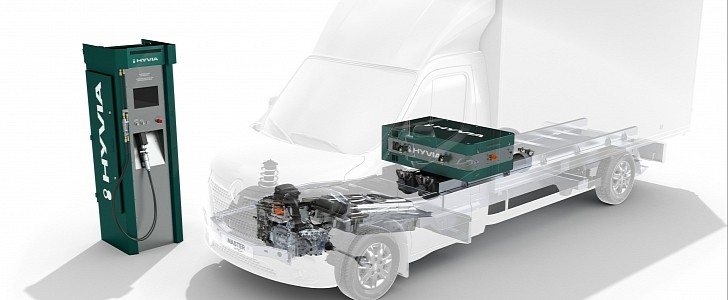Renault wants to take the high road when it comes to mobility solutions and chooses a green hydrogen path for its new HYVIA venture.
“HY” stands for hydrogen and “VIA” for road, and it’s Renault’s attempt to create a hydrogen mobility ecosystem. The automaker plans to become more environmentally-friendly by developing three hydrogen-running versions of its Master model, which will be available by the end of the year. An official market launch is also scheduled for the first quarter of 2022.
Renault’s project is a collaboration with Plug Power, an American hydrogen fuel cell system developer. In its recent statement, the French car manufacturer announced the name of the three LCVs (light commercial vehicles): a Master Van H2-TECH, Master Chassis Cab H2-TECH, and the Master Citybus H2-TECH.
With a range of up to 310 miles (500 km) and a cargo volume of 12m3, the Master Van H2-TECH is a large vehicle perfect for the transport of goods.
The Master Chassis Cab H2-TECH is even more spacious, with 19m3 cargo space. It has a range of 155 miles (250 km).
Renault’s third hydrogen-powered LCV is the Master Citybus H2-TECH, an urban minibus with a capacity of 15 passengers.
All HYVIA vehicles will be assembled in France, at the Flins factory and will be available for purchase in Europe. Hydrogen refueling stations will also be put together at the same location with the possibility to rent or buy them.
The new Renault cars will be equipped with a 33kWh battery, a 30kW fuel cell, tanks containing between 6.6 and 15.4 pounds (3 to 7 kg) of hydrogen, depending on the model of the car. They will be built in a dual power architecture, meaning they’ll be powered both by electric energy as well as hydrogen-based energy.
With its HYVIA venture, Renault hopes to meet the need of businesses, large accounts, fleets, and local communities, while driving energy transition at the same time.
Renault’s project is a collaboration with Plug Power, an American hydrogen fuel cell system developer. In its recent statement, the French car manufacturer announced the name of the three LCVs (light commercial vehicles): a Master Van H2-TECH, Master Chassis Cab H2-TECH, and the Master Citybus H2-TECH.
With a range of up to 310 miles (500 km) and a cargo volume of 12m3, the Master Van H2-TECH is a large vehicle perfect for the transport of goods.
The Master Chassis Cab H2-TECH is even more spacious, with 19m3 cargo space. It has a range of 155 miles (250 km).
Renault’s third hydrogen-powered LCV is the Master Citybus H2-TECH, an urban minibus with a capacity of 15 passengers.
All HYVIA vehicles will be assembled in France, at the Flins factory and will be available for purchase in Europe. Hydrogen refueling stations will also be put together at the same location with the possibility to rent or buy them.
The new Renault cars will be equipped with a 33kWh battery, a 30kW fuel cell, tanks containing between 6.6 and 15.4 pounds (3 to 7 kg) of hydrogen, depending on the model of the car. They will be built in a dual power architecture, meaning they’ll be powered both by electric energy as well as hydrogen-based energy.
With its HYVIA venture, Renault hopes to meet the need of businesses, large accounts, fleets, and local communities, while driving energy transition at the same time.








